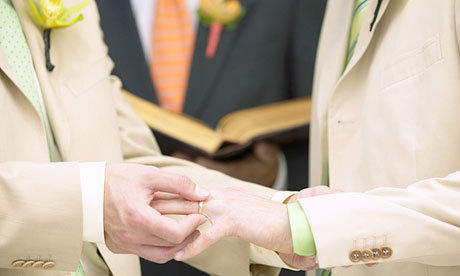MOSCOW, February 6 - RAPSI, Ingrid Burke. In a vote of 400 to 175, the UK House of Commons voted in favor of a bill aimed at legalizing same sex marriage in the second reading Tuesday.
The substantive text of the bill cuts straight to the point: “Marriage of same sex couples is lawful.”
Much of the remaining text is dedicated to balancing the interests of equality despite gender preference with religious freedom. While religious institutions are entitled to “opt in” to conduct same sex marriage ceremonies, no religious institution or individual will be required to do so.
This is notable in light of a recent decision by the European Court of Human Rights (ECHR) that centered partially on this very balance of interests.
While homosexual couples in the UK currently lack the right to marry, civil partnerships between same sex couples are permitted, in accordance with 2009’s Civil Partnership Act.
The ECHR held last month that the UK had acted properly with regard to the refusal of Registrar of Births, Deaths, and Marriages Lilian Ladele to perform same sex civil partnership ceremonies. The devout Christian viewed homosexuality as repugnant to her Christian beliefs, and thus refused to comply with the 2009 law, after which she was threatened with termination.
The Court displayed a great deal of concern with the imperative of freedom of religion, including the freedom to manifest one’s religious beliefs in the workplace. Still, the state is authorized to limit this freedom to a certain extent when religious observance threatens the rights granted to others in accordance with the European Convention of Human Rights (Convention).
Finding that the UK had adequately balanced Ladele’s interests in religious freedom with the state’s interest in promoting equal opportunities and preventing discrimination, the ECHR held against Ladele.
In the same judgment, however, the Court ordered the UK to pay damages to two other Christians who had been prevented from wearing jewelry bearing crucifixes in the work place, driving home the necessity of ensuring a proper balance between religious and other fundamental freedoms.
Notably, the substantive text of the bill is preceded with a statement of its compatibility with the Convention.
The bill further stipulates that same sex couples who have previously joined together in civil partnerships will be entitled to convert such partnerships to marriage under the pending law. Additionally, it would provide for the legitimization of the marriages of transsexual individuals, in view of their acquired genders.
The bill was introduced to the House of Commons on January 24, and has now passed in the first and second readings. Next, it will be sent for consideration by the Public Bill Committee, which will dissect the bill and consider it part by part.



